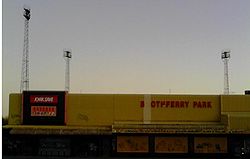Boothferry Park

Boothferry Park in 2008
|
|
| Location | Hull, England |
|---|---|
| Capacity | 15,160 |
| Surface | Grass |
| Construction | |
| Opened | 1946 |
| Closed | 2002 (as a football stadium) 2007 (supermarket tenants) |
| Demolished | 2008–2010 |
| Tenants | |
|
Hull City (1946–2002) |
|
Hull City (1946–2002)
Kwik Save (1990s–2007)
Boothferry Park was a football stadium in Kingston upon Hull, and was home to the football club Hull City for over 50 years from 31 August 1946 until December 2002, when they moved to the Kingston Communications Stadium.
In later years financial constraints forced Hull City to originally allow Grandways then later Kwik Save and Iceland supermarkets to embed themselves into part of the stadium's structure. Parts of the ground were finally demolished in early 2008, more than five years after the last game was played there, with the remainder finally demolished in the course of 2011.
The ground was originally planned in 1929, and work began on the site from 1932 based near the Humber Estuary. Financial difficulties severely hampered this development, with the playing area and part of the terracing appearing over the following 12 months before work and progress ground to a halt. A proposal in 1939 for a sports stadium on the site was the catalyst for further development, as even though this threw up doubt for the original stadium plans, no suitable financial offer for the land was forthcoming, and instead the Hull City board enquired after, and were granted, a Football Association loan to the sum of £6,600. This meant the new ground would be ready for the opening of the 1941 season.
The onset of the Second World War was to again frustrate the development of the football ground, as during the war, the ground was used by the Home Guard, and was, for a period, used to repair tanks. This, not unexpectedly, had an adverse effect on the playing area – following the end of the war, the pitch was in very poor shape and prone to waterlogging.
Building materials were hard to come by in the postwar years for something as "frivolous" as a football stadium in the heavily-bombed city, this and the state of the pitch meant that the ground was still not in a usable state by the 1945/46 season, so the club was forced to return to playing its matches at one of its former homes, The Boulevard, the then home of Hull F.C., one of the city's two rugby league clubs.
...
Wikipedia
